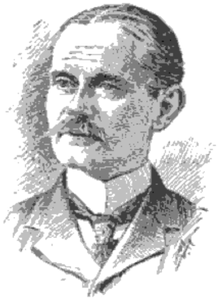Edward Percy Moran (1862–1935), sometimes known as Percy Moran, was an American artist known for his scenes of American history.
Edward Percy Moran | |
|---|---|
 | |
| Born | July 29, 1862 Philadelphia, Pennsylvania, U.S. |
| Died | March 25, 1935 (aged 72) New York City, U.S. |
| Nationality | American |
| Education | |
| Known for | Painting |
| Awards | First Hallgarten Prize (1886) |
Early life and education
editHe was born in Philadelphia on July 29, 1862, to Edward Moran, an artist who immigrated to the United States from England.[1]
Moran studied under his father and at the Pennsylvania Academy of the Fine Arts in Philadelphia and the National Academy of Design in New York City.
Career
editHe was a painter of historical American subjects, and examples of his work are found in many prominent collections.
Death
editHe died in New York City on March 25, 1935, at age 72.[2]
His brother Leon Moran[3] (born 1864), his uncles Peter Moran (born 1842) and Thomas Moran, and his cousin Jean Leon Gerome Ferris were also prominent American artists.[4]
Images
edit-
A Fair Puritan
-
Signing the Mayflower Compact, ca. 1900, now in the collection of the Pilgrim Hall Museum
-
The Birth of Old Glory (1917)
References
edit- ^ The National Cyclopaedia of American Biography. Vol. X. J. T. White Company. 1900. p. 367. Retrieved July 24, 2020 – via Google Books.
- ^ "Edward Percy Moran Dies". St. Louis Post-Dispatch. New York. Associated Press. March 26, 1935. p. 26. Retrieved July 24, 2020 – via Newspapers.com.
- ^ Artwork by Leon Moran
- ^ School Education Published by School Education Co. (1898), Item notes: v. 17